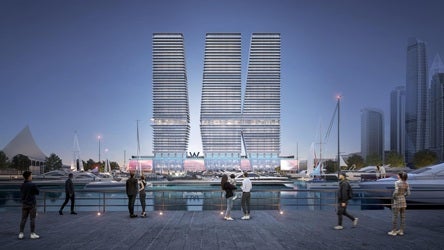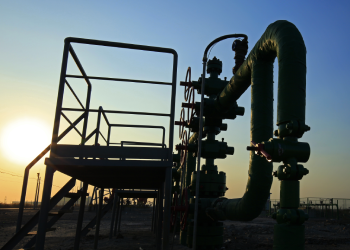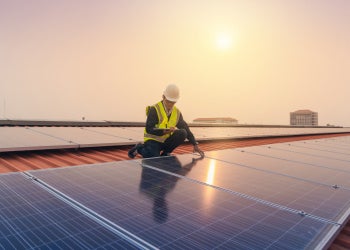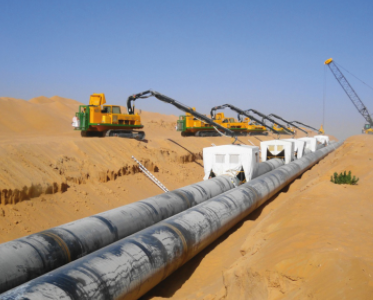Mena clean energy pipeline climbs to 246GW
14 February 2025

Some 47.4GW of clean and renewable energy power generation plants are under construction across 15 countries in the Middle East and North Africa (Mena) region.
Based on the latest available data from MEED and MEED Projects, a further 199GW are in the study, design, prequalification and bid stages.
The total pipeline of 246GW is close to half of renewable energy capacity additions globally, which stood at 510GW in 2023.
Saudi Arabia leads with some 17.7GW of renewable energy capacity under construction, mainly comprising an estimated 16.5GW of capacity from solar power plants, which were procured under a public tendering process as well as direct negotiations. Wind power accounts for the rest.
Egypt is the second-largest market, with under-construction projects including the first two units of the El-Dabaa nuclear power plant in Matrouh and some 3GW of solar and 3.8GW of wind power plants.
Iran has the third-largest clean energy capacity under construction, including over 3.4GW of hydropower and 2.4GW of nuclear power.
The UAE ranks fourth, with a total of 3.7GW of capacity under execution. These projects include the 1.5GW Al-Ajban solar photovoltaic (PV) plant in Abu Dhabi, the 1.8GW phase 6 of Dubai’s Mohammed Bin Rashid Al-Maktoum Solar Park project, the 250MW hydropower plant in Dubai and a waste-to-energy project in Abu Dhabi.
Morocco’s capacity under construction is estimated at around 3.6GW, dominated by solar power plants, which have a cumulative capacity of roughly 2.8GW.
Overall, solar PV projects – some in combination with battery energy storage system plants – account for 32GW or close to 68% of the capacity under construction across the Mena region.
Wind and nuclear account for 14% and 10% of the total, respectively, with hydropower plants accounting for 8.4%.
An estimated 9.4GW of the projects under execution, mostly solar, are due to be completed this year. A further 11.9GW are set to be delivered in 2026, and 23GW by 2027. The rest, including the first reactors of the El-Dabaa nuclear power plant in Egypt, are expected to be completed in 2028 or beyond.
This implies that electricity from clean and renewable power sources is set to become a substantial part of the region’s energy mix, particularly in the states that have been cited.
The known solar PV installed capacity in the Middle East, for instance, is estimated to be around merely 18GW as of 2023.
It could also imply that the targets for clean and renewable sources to account for 50% or more of the electricity production mix in certain Mena countries may be achievable, with the region’s largest economy, Saudi Arabia, aiming to procure 20GW of renewable energy annually until it reaches the new target of up to 130GW by 2030 “subject to demand growth”.
Pre-execution
The pipeline of pre-execution projects is equally impressive, potentially yielding an electricity production capacity of close to 200GW, if all these planned projects are implemented.
Most of these projects are envisaged to be grid-connected and exclude captive renewable energy plants catering to industries or enterprises, or those announced as part of integrated green hydrogen and ammonia production facilities.
Saudi Arabia has the largest pre-execution pipeline of over 83GW. This includes around 55GW of capacity in the conceptual stage, catering to the Neom gigaproject, the $500bn masterplan northwest of the kingdom that aims to be powered 100% by renewable energy.
Saudi Arabia’s clean and renewable energy pipeline, inclusive of the Duwaiheen nuclear plant project, is larger than the planned capacity across the next four largest markets: Egypt, Morocco, the UAE and Iraq.
Notably, roughly a quarter of the pre-execution projects in Saudi Arabia are in the prequalification and bidding stages, whereas a mere 3.2% of the planned projects in Egypt have so far reached these stages.
In Morocco, a project called Xlinks, which aims to deliver clean energy to the UK, accounts for about half of the renewable energy capacity being planned.
In the UAE, some 19% of the $16.4bn pre-execution projects are in the prequalification and bid stages. The bulk of capacity in the design stage includes the next phase of the Barakah nuclear power plant as well as the round-the-clock solar PV and battery energy storage system (bess) plant facility in Abu Dhabi.
The 5.2GW solar /19GWh bess project in Abu Dhabi, estimated to require an investment of $6bn, is expected to reach financial close in Q2, which means it will rapidly move from design to execution. Abu Dhabi Future Energy Company (Masdar), the project’s main developer, has already selected the engineering, procurement and construction and other sub-contractors for the project.
Risks and opportunities
The massive renewable capacity buildout across the major Mena region is expediting the procurement of bess plants, whether independently by the transmission and distribution (T&D) entities – as exemplified by recent projects in Saudi Arabia – or in combination with a solar PV project, such as the UAE’s 1GW round-the-clock solar project.
Batteries will help boost the flexibility of the electricity grids as more intermittent renewable power is added and overall demand increases.
The rapid decline in battery unit prices has helped bring several bess projects with substantial capacities to the market over the past 12 to 18 months, and this pace is expected to further accelerate in the future.
Yet, batteries alone will not be sufficient to address the peak electricity demand, particularly across the GCC states, which some experts say falls between 6:00 pm and 6:00 am, especially in the summer months, coinciding with a period when solar PV plants do not produce power and where only a very limited wind capacity may be available.
“There is no doubt batteries can help address that gap, but maybe not to the extent some may envisage,” notes a Dubai-based industry source.
“The issue is not the unit price of batteries, but the volume that you need to address that gap and how much it would cost. Depending on the configuration and the volume of batteries installed, you have bess systems that can provide five to six hours of storage today,” he explains. “The big question is how will the grid cope with the surge in electricity demand at 6 am?”
Given that the cost of lithium-ion batteries was considered highly prohibitive as recently as a year ago, the expectation is that the scale of new projects and demand will continue to drive rapid innovations to enable more flexible grids during the energy transition.
 READ THE FEBRUARY MEED BUSINESS REVIEW
READ THE FEBRUARY MEED BUSINESS REVIEW
Trump unleashes tech opportunities; Doha achieves diplomatic prowess and economic resilience; GCC water developers eye uptick in award activity in 2025.
Published on 1 February 2025 and distributed to senior decision-makers in the region and around the world, the February MEED Business Review includes:
|
> AGENDA 1: Trump 2.0 targets technology
> AGENDA 2: Trump’s new trial in the Middle East
> AGENDA 3: Unlocking AI’s carbon conundrum
> GAZA: Gaza ceasefire goes into effect
> LEBANON: New Lebanese PM raises political hopes
> WATER DEVELOPERS: Acwa Power improves lead as IWP contract awards slow
> WATER & WASTEWATER: Water projects require innovation
> INTERVIEW: Omran’s tourism strategies help deliver Oman 2040
> PROJECTS RECORD: 2024 breaks all project records
> REAL ESTATE: Ras Al-Khaimah’s robust real estate boom continues
> QATAR: Doha works to reclaim spotlight
> GULF PROJECTS INDEX: Gulf projects market enters 2025 in state of growth
> CONTRACT AWARDS: Monthly haul cements record-breaking total for 2024
> ECONOMIC DATA: Data drives regional projects
> OPINION: Between the extremes as spring approaches
|
Exclusive from Meed
-
 Arada awards $408m W Residences Dubai Harbour contract
Arada awards $408m W Residences Dubai Harbour contract23 February 2026
-
 Seven companies show interest in $3.3bn Kuwait gas project
Seven companies show interest in $3.3bn Kuwait gas project23 February 2026
-
 Egypt tenders 500MW solar IPP
Egypt tenders 500MW solar IPP19 February 2026
-
 Local contractor wins $143m Jeddah sewage contracts
Local contractor wins $143m Jeddah sewage contracts19 February 2026
-
 Saudi Arabia prequalifies firms for gas transmission grids
Saudi Arabia prequalifies firms for gas transmission grids19 February 2026
All of this is only 1% of what MEED.com has to offer
Subscribe now and unlock all the 153,671 articles on MEED.com
- All the latest news, data, and market intelligence across MENA at your fingerprints
- First-hand updates and inside information on projects, clients and competitors that matter to you
- 20 years' archive of information, data, and news for you to access at your convenience
- Strategize to succeed and minimise risks with timely analysis of current and future market trends

Related Articles
-
 Arada awards $408m W Residences Dubai Harbour contract
Arada awards $408m W Residences Dubai Harbour contract23 February 2026
Register for MEED’s 14-day trial access
Sharjah-based real estate developer Arada has awarded a AED1.5bn ($408m) contract for the main construction works on its W Residences project at Dubai Harbour.
The contract was awarded to the local Engineering Contracting Company.
The development comprises 490 branded residences across three towers.
The project's enabling works, including excavation and piling, have begun and are being carried out by another local firm, APCC Piling & Marine Contracting.
Arada has awarded APCC a separate AED51m ($14m) contract to undertake the enabling works.
The development will consist of residential, retail and leisure facilities and will be operated by US-based Marriott International.
Arada launched the project in October 2024, as MEED reported.
The latest contract award follows Arada's award of two contracts, worth AED2.7bn ($735m), for construction work on all four phases of the Masaar 2 residential community in the Rowdat district of Sharjah.
Arada awarded Sharjah-based Intermass Contracting a contract for the construction of phases one, three and four.
Abu Dhabi-based contractor Pivot Engineering & General Contracting won a contract to build the second phase of the project.
The overall scheme encompasses the construction of 1,997 residential units across all four phases.
Construction is expected to begin shortly, and the project is slated for completion by 2028.
Arada is the developer behind three masterplanned residential communities in Sharjah. The Aljada, Masaar and Nasma Residences communities are valued at a combined AED33bn.
https://image.digitalinsightresearch.in/uploads/NewsArticle/15717440/main.jpg -
 Seven companies show interest in $3.3bn Kuwait gas project
Seven companies show interest in $3.3bn Kuwait gas project23 February 2026

At least seven companies have shown interest in participating in the planned tender for a Kuwait Gulf Oil Company (KGOC) project to develop an onshore gas plant, according to industry sources.
The project budget is estimated to be $3.3bn and the last meeting with contractors to discuss the project took place in Kuwait on 10 February.
Previous meetings with contractors took place at the offices of Technip Energies in Abu Dhabi.
Contractors that have sent representatives to the meetings include:
- Samsung E&A (South Korea)
- Larsen & Toubro (India)
- Tecnicas Reunidas (Spain)
- Saipem (Italy)
- Hyundai Engineering & Construction (South Korea)
- Hyundai Engineering Company (South Korea)
- JGC (Japan)
At the last meeting, contractors were told that the invitation to bid is currently scheduled to be issued at the end of March.
It was also confirmed that Kuwait’s Central Agency for Public Tenders (Capt) will not be involved in the tender process.
Capt is supposed to review technical and commercial evaluations of bids and verify that bidding is competitive.
It is understood that not requiring Capt to approve this tender will speed up the tender process.
The plant will have the capacity to process up to 632 million cubic feet a day of gas and 88.9 million barrels a day of condensates from the Dorra offshore field, located in Gulf waters in the Saudi-Kuwait Neutral Zone.
In July last year, MEED reported that KGOC had initiated the project by launching an early engagement process with contractors for the main engineering, procurement and construction tender.
France-based Technip Energies completed the contract for the front-end engineering and design.
The facility will be developed next to Kuwait’s Al-Zour refinery.
https://image.digitalinsightresearch.in/uploads/NewsArticle/15717358/main.png -
 Egypt tenders 500MW solar IPP
Egypt tenders 500MW solar IPP19 February 2026
Register for MEED’s 14-day trial access
Egyptian Electricity Transmission Company (EETC) has issued a request for qualifications for a 500MW solar photovoltaic (PV) independent power producer project in Egypt’s West of Nile area.
The bid submission deadline is 11 May.
The project is being supported by the European Bank for Reconstruction & Development and will be developed under a build-own-operate model.
Developers will be responsible for designing, financing, constructing, owning and operating the plant, with EETC acting as the offtaker for generated electricity.
US/India-based Synergy Consulting is acting as lead, financial and commercial advisor for this transaction.
The project forms part of Egypt’s strategy to strengthen long-term electricity supply and increase renewable generation capacity.
Egypt is targeting 42% renewable energy in its power mix by 2030. The country aims to raise this share to 65% by 2040.
EETC previously had plans to build a 200MW solar plant in a west Nile area but cancelled the tender for the project in 2020.
Egypt's power sector had its strongest year in over a decade last year, accounting for $4.2bn of total contract awards.
Despite dipping from the previous year, solar accounted for about $1bn of total awards.
In November, a consortium of local firms Hassan Allam Utilities and Infinity Power won contracts to develop two solar PV projects with a combined capacity of 1,200MW, supported by 720 megawatt-hours (MWh) of battery storage.
The UAE’s Amea Power and Japan’s Kyuden International Corporation also recently reached financial close on a $700m project comprising a 1,000MW solar plant and 600MWh battery system in Aswan.
The scheme is backed by a $570m debt package led by the International Finance Corporation and is expected to become Africa’s largest single-asset solar and storage facility when it enters operation later this year.
https://image.digitalinsightresearch.in/uploads/NewsArticle/15701778/main.jpg -
 Local contractor wins $143m Jeddah sewage contracts
Local contractor wins $143m Jeddah sewage contracts19 February 2026
Register for MEED’s 14-day trial access
Saudi Arabia’s National Water Company (NWC) has awarded two sewage network contracts worth a combined SR536.3m ($143m) to local contractor Civil Works Company.
The projects will be implemented over 32 months from site handover and will serve northern Jeddah districts.
The first contract, valued at SR278.5m ($74.3m), covers incomplete main lines and secondary sewage networks serving parts of the Al-Bashair, Al-Asala and Al-Falah neighbourhoods.
The scope includes pipelines ranging from 200mm to 800mm in diameter with a total length of about 54.8 kilometres (km).
The package also includes sewage tunnels with diameters ranging from 600mm to 1,800mm and a total length of approximately 6.5km. Works will also serve the Taybah, Abhar Al-Shamaliyah and Al-Hamdaniyah districts.
The second contract is valued at SR257.8m ($68.8m). It covers the implementation of main lines and sub-networks to serve part of the Al-Hamdaniya neighbourhood.
The works include pipelines ranging from 200mm to 1,500mm in diameter with a total length of about 78.5km. The scope also includes horizontal drilling works for sewage tunnels with diameters from 1,200mm to 1,400mm and a total length of approximately 205 metres.
https://image.digitalinsightresearch.in/uploads/NewsArticle/15699620/main.jpg -
 Saudi Arabia prequalifies firms for gas transmission grids
Saudi Arabia prequalifies firms for gas transmission grids19 February 2026
Register for MEED’s 14-day trial access
Saudi Arabia's Energy Ministry has prequalified companies to develop natural gas distribution networks in five industrial cities in the kingdom on a build-own-operate (BOO) basis.
The industrial zones earmarked are Al-Kharj Industrial City; Sudair City for Industry and Business; and the First, Second and Third Industrial Cities in Jeddah, the Energy Ministry said in a statement.
The contractors prequalified to bid for the natural gas transmission grids BOO scheme include eight standalone firms and seven consortiums:
- East Gas (Egypt)
- Natural Gas Distribution Company (Saudi Arabia)
- Egyptian Kuwaiti Advanced Operation and Maintenance (Saudi Arabia)
- Modern Gas (Egypt)
- Saab Energy Solutions (Saudi Arabia)
- Sergas Contracting (Saudi Arabia)
- Bharat Petroleum Corporation (India)
- UniGas Arabia (Saudi Arabia)
- Best Gas Carrier / Khazeen / Mubadra (Saudi Arabia)
- Al Sharif Contracting (Saudi Arabia) / Anton Oilfield Services Group (China) China Oil and Gas Group
- Hulul (owned by Saudi Arabia’s National Gas and Industrialization Company) /Al-Fanar Gas Group (UAE)
- Indraprastha Gas (India) / Masah Contracting (Saudi Arabia)
- Expertise Contracting / PGL Pipelines (UK)
- National Gas Company (Egypt) / Egypt Gas (Egypt)
- Taqa Arabia (Egypt) / Taqa Group (UAE)
The Energy Ministry has set a deadline of 23 April for these prequalified contractors to submit technical bids.
The ministry added in its statement that it has identified a total of 36 industrial cities in Saudi Arabia for gas infrastructure development.
https://image.digitalinsightresearch.in/uploads/NewsArticle/15699582/main0334.png


